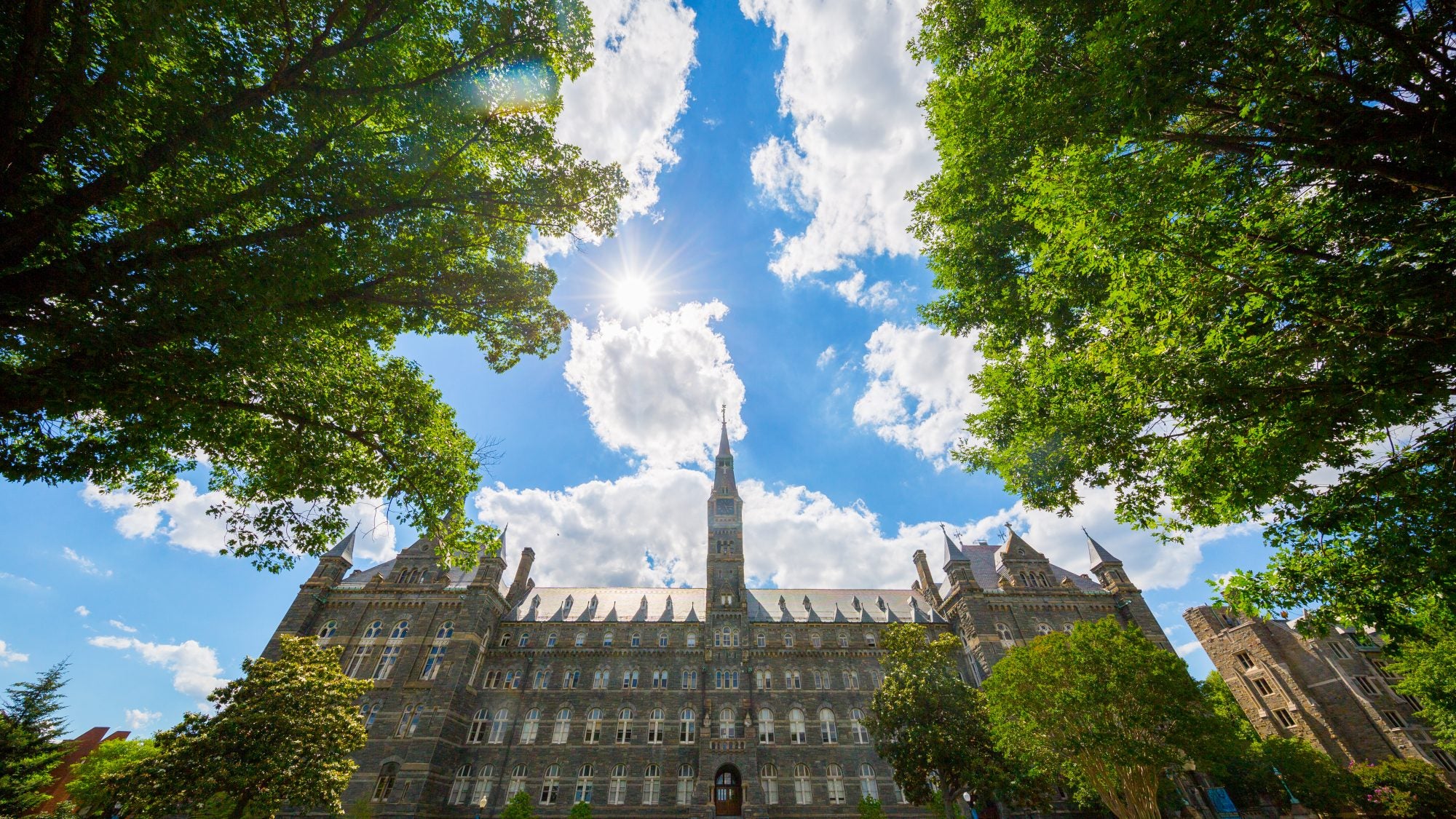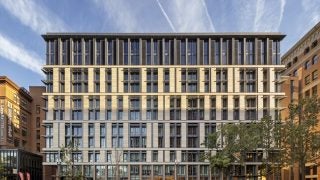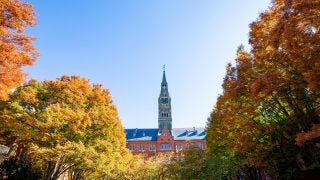The university’s financial aid will expand by 5% to $269 million, Georgetown’s largest investment in financial aid in its history. The expansion of financial aid is a reflection of Georgetown’s need-blind admissions policy and commitment to meeting the full demonstrated financial need of undergraduate students.
“The increase in financial aid is a reaffirmation of our commitment to ensure that every student has the ability to receive a Georgetown education regardless of their socioeconomic background,” said David Green, Georgetown’s senior vice president and chief operating officer.
New Faces on the Board of Directors
During its meeting, the university welcomed eight new members to the board of directors who will each serve a three-year term starting on July 1, 2023.
The new members include:
- Abdulla bin Ali Al-Thani, advisor in the Amiri Diwan in Doha, Qatar, and the chair of the executive board and vice chairman of the board of regents of Qatar University
- Joseph V. Amato (B’84), president of Neuberger Berman Group LLC and chief investment officer of Equities
- Mannone Butler (B’94, L’99), head of programs and partnerships at the National Basketball Social Justice Coalition
- Anthony R. Coscia (SFS’81), partner and executive committee member of Windels Marx Lane & Mittendorf, LLP, and chairman of the board of directors of Amtrak
- Daniel P. O’Day (C’86), chairman and CEO of Gilead Sciences
- Meroë Park (SFS’89), deputy secretary and chief operating officer of the Smithsonian and former executive director and chief operating officer of the CIA
- Fr. Francisco de Roux, S.J., visiting fellow at the Georgetown Americas Institute and the chair of the Commission for the Clarification of Truth, Coexistence and Non-Repetition
- William C. Sonneborn (B’92), director at International Finance Corporation and former president of EIG Global Energy Partners and CEO of KKR Asset Management
The board also expressed its deep gratitude for the service of six outgoing members of the board.
Outgoing members include Marijn E. Dekkers, chairman of Novalis LifeSciences, LLC; Bonnie W. Gwin (SFS’82, G’83), vice chairman at Heidrick & Struggles and co-managing partner of the Global CEO & Board of Directors Practice; Tyree P. Jones (L’86), partner at Reed Smith LLP; Dikembe Mutombo (C’91), chairman and president of the Dikembe Mutombo Foundation; Michael G. Psaros (B’89); co-founder and managing director of KPS Capital Partners, LP; and Fr. Antonio Spadaro, S.J., editor-in-chief of La Civiltà Cattolica.
Construction on the Hilltop
Board members received key updates on construction projects taking place on the Hilltop, including the recently started demolition and redevelopment of Henle Village. The university will be turning the residence hall into a larger, more environmentally sustainable and accessible apartment-style facility for undergraduate students. The project will feature a new residence hall with 780 beds, an overall increase of 312 beds for students, and a wellness center, study spaces, an outdoor courtyard and various resident amenities. The project is expected to be completed by the summer of 2025.
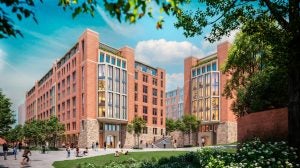
In addition, the board received updates on the renovation of the Lauinger Library’s Pierce Reading Room, which will create a modern, welcoming space for student collaboration, studying and learning. Originally built in 1970 as a premier study space, the reading room will undergo a full transformation into a contemporary, highly functional state-of-the-art library environment. The updated space will include a variety of casual and formal seating options, a multi-purpose visualization and learning lab and group study rooms. The revitalized reading room will also feature more natural daylight with views of the Potomac River and northern Virginia.
The board also approved $30 million in funding for deferred maintenance in the new fiscal year. These funds will be used to upkeep fire and life safety systems; mechanical, electrical and plumbing repairs; building structural repairs such as roofs; elevator modernization; townhouse renovation; and site improvements, including sidewalks, accessibility, paving, landscaping and more.
An Update on the Capitol Campus
In addition to construction projects on Main Campus, the board of directors received updates on projects on Georgetown’s Capitol Campus in downtown Washington, DC.
The McCourt School of Public Policy’s new home on 125 E St. NW continues to be on track to welcome students in the summer of 2024. The 145,600-square-foot building, located next to Georgetown Law and within walking distance of the U.S. Capitol, will feature new signature event spaces for the McCourt School and Georgetown University communities, including a 400-seat auditorium and a rooftop event space. The new building will unite McCourt School students, faculty, research centers and staff in the same location for the first time since the School’s founding in 2013, accelerating collaboration and spurring new partnerships.
Sustainability is a priority in the design of the building. 125 E St. NW aims to earn a LEED Platinum certification, following 55 H Street NW, a new residence hall which recently became Georgetown’s first building to achieve the highest sustainability certification by the U.S. Green Building Council.
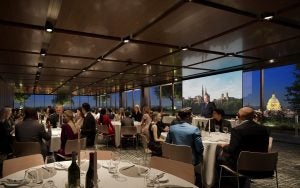
Georgetown Hosts Conference With Pope Francis and Martin Scorcese
The board received a recap of the Global Aesthetics of the Catholic Imagination conference Georgetown co-hosted in late May in Rome, Italy. The conference included an audience with Pope Francis and a keynote address from award-winning film director and producer Martin Scorsese.
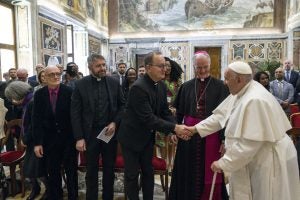
“The conference was a powerful way to explore the rich history and cultural representations of Catholicism around the world,” said Thomas Banchoff, director of the Berkley Center for Religion, Peace, and World Affairs and vice president of global engagement.
Co-sponsored by Georgetown’s Office of Mission & Ministry and the Jesuit journal, La Civiltà Cattolica, the conference brought together Catholic artists and scholars from around the world to examine how Catholicism has shaped their art and the interplay between their faith tradition and their various cultural contexts.
Fr. Antonio Spadaro, S.J., editor-in-chief of La Civiltà Cattolica and a recent outgoing board member; Fr. Mark Bosco, S.J., vice president for Mission & Ministry; Annalisa Buttici, assistant professor in the Department of Theology and Religious Studies; and Fr. Joseph Simmons, S.J., a postdoctoral fellow at Georgetown, all participated in the conference.
“We were delighted to have an audience with His Holiness, Pope Francis, and to have Martin Scorsese offer a keynote address at our conference in Rome,” Bosco said. “This conference was an enriching opportunity for us to advance the Catholic and Jesuit mission of Georgetown, and to connect with artists from all over the world.”
Exploring the Implications of AI
At the summer meeting, board members also heard from several faculty members on artificial intelligence and models for how to regulate the groundbreaking technology. The board also considered how AI will shape the future of education and how Georgetown can responsibly use AI to educate its students.
Several Georgetown faculty presented before the board and participated in a panel discussion, including Lisa Singh, professor in the Department of Computer Science; Anupam Chander, Scott K. Ginsburg Professor of Law and Technology; Calvin Newport, associate professor in the Department of Computer Science; and Eddie Maloney, professor of the practice and executive director of the Center for New Designs in Learning and Scholarship.
